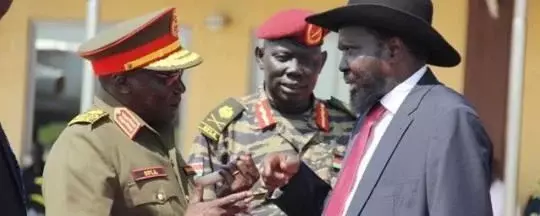A rebel leader has said that the current environment in South Sudan is not conducive for free and fair elections before the end of the transitional period in February 2023.
President Salva Kiir, opposition leader Riek Machar and a handful of other groups signed a peace agreement in September 2018. But the peace agreement provisions remain largely unimplemented, and the parties set February 2023 as the end of the transitional period.
The agreement encourages the transitional government to hold elections before February 2023. On Thursday, Sudan’s foreign affairs minister Ali al-Sadiq announced Wednesday that the parties to the South Sudan peace deal agreed to extend the transitional coalition government period.
General Paul Malong, leader of the rebel group South Sudan United Front/Army (SSUF/A), told Radio Tamazuj in an interview on Wednesday that the current environment is not conducive for free and fair elections as there is no guarantee that many politicians will be able to contest and the fact that some parties will not be granted opportunities to campaign for the elections.
“Currently, people should rule out the conduct of elections in South Sudan. You cannot contest elections as a party while holding guns; it is impossible,” Malong said. “Even if people agree today that there should be general elections, many politicians cannot go to some areas in South Sudan.”
Malong, a former military chief, said the only solution in South Sudan is for all South Sudanese political forces and all the other stakeholders to build consensus, which will lead to the establishment of a new transition with a government of technocrats as the transitional period comes to an end by February 2023.
The rebel leader voiced rejection of the ongoing talks in Juba to extend the transitional government’s lifespan, noting that the move does not serve citizens’ interests.
“If you keep extending the transitional government’s tenure and the citizens are still staying in the camps and outside the country, is this what South Sudanese need?” Malong asked.
According to General Malong, there is a need for roundtable talks that will lead to reforms and the adoption of a new transitional government, noting that the military should be reformed and unified to address rampant insecurity in the country.
“We want to see all the tribes of South Sudan being represented in the military. We also want to see reforms in many sectors, not just the military. The country urgently needs reforms in all the sectors,” Malong said.
General Malong has reaffirmed his commitment to the Rome talks with the government under the auspices of the Sant’Egidio Community. “Our proposal to have a government of technocrats in the country is our position as non-signatory parties, but it is subject to discussions with the other side. The transitional period is coming to an end, and nothing has been done by the transitional government,” Malong said.
In the last two weeks, General Malong and other holdout opposition groups signed a missive calling on all the South Sudanese stakeholders to convene a roundtable conference in a neutral venue conducive to freely exchanging ideas about the country’s fate and to agree on a new dispensation beyond February 2023.
The document was signed by Thomas Tut Doap of United Democratic Revolutionary Movement/Army UDRM/A, Emmanuel Ajawin of National Democratic Movement Patriotic Front (NDM-PF), Gen. Thomas Cirillo of National Salvation Front (NAS), General Paul Malong Awan of South Sudan United Front/Army (SSUF/A), Alex Yatta Lukadi of Sudan National Movement for Change (SSNMC) and Gen. Pagan Amum of the Real SPLM.




